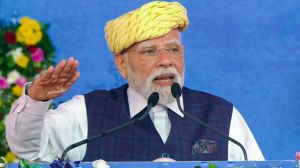Terror in the music hall
The hostage taking of over 700 innocents, engaged in the peaceful activity of attending a musical concert, by a group of heavily armed Chech...

The hostage taking of over 700 innocents, engaged in the peaceful activity of attending a musical concert, by a group of heavily armed Chechens carrying large quantities of weapons must be condemned in the strongest terms by every civilised nation.
Historically, Chechens have been frequently involved in hostage taking and terrorist killings and historians trace this trend to as far back as the mid-19th century. The present generation of Chechens have taken hostages on a number of occasions in the recent past. The worst case so far was the hostage taking of nearly 1,000 innocents in a hospital in the southern Russian town of Budyonnovsk in the summer of 1995, which resulted in the death of nearly a 100 people. Seventy eight were killed when Chechens took hundreds of hostages in another hospital the following year. Over the years, Chechen terrorism has extended beyond Russian/Chechen territories and many Chechen fighters have found their way into international terrorist groups across the world.
At the same time, it is clear that not all the so-called ‘Chechen terrorists’ are actually Chechen in origin. By a strange coincidence, the hostage taking in Moscow coincides with the admission in a German court by Mounir Motassadeq, a 28-year-old Moroccan and a member of the Hamburg cell suspected to be part of the group responsible for the terrorist acts of 9/11.
He revealed that he had travelled to Kandahar two years ago to join the Al Qaeda training camp to fight in Chechnya, but that he was sent back on the ground that that fighters were not needed for this purpose at that time. Time and again, the global linkages of international terrorism have been coming into focus. And running through almost all of them are the twin elements of religious motivation and separatism.
The crisis in Moscow only re-emphasises the true nature of the challenge of dealing successfully with terrorism. At the very minimum, eradicating terrorism would have to take cognisance of the reality that separatism, ethno-religious ideologies and the use of terror as an instrument of policy had been growing virtually unchecked, and even legitimised by some states, for more than two decades.
Ethno-religious separatist terrorism has been responsible for the death and injury to thousands of innocents across the world and has sought to exploit the emotions of impressionable young people, many of whom have not had access to modern education and employment. The real challenge, therefore, must be seen in terms of dealing with the ideas and factors that promote such violence.
The focus on the infrastructure of terrorism, disruption, dissolution and destruction of terrorist groups must obviously remain a central policy objective of the world’s nations. Unless the world firmly and finally rejects separatist terrorism, the incentive to use indiscriminate violence will continue.
Photos



- 01
- 02
- 03
- 04
- 05




























